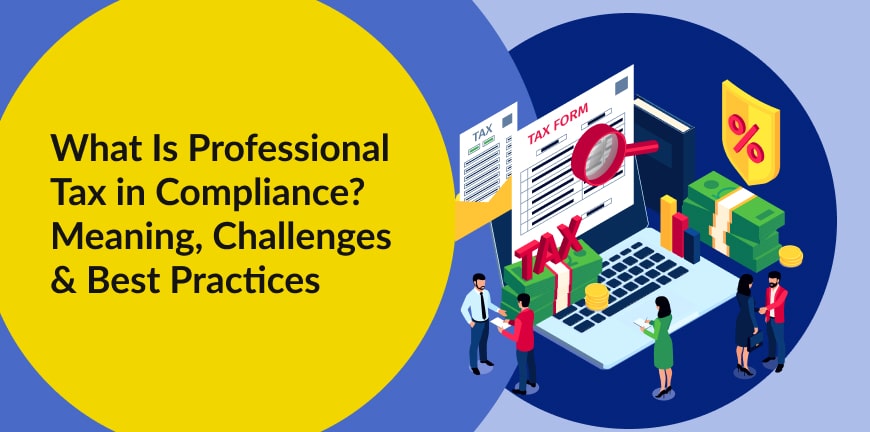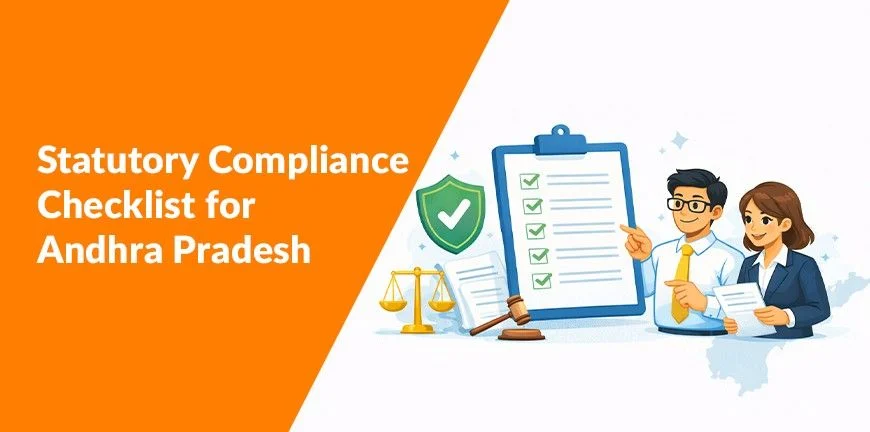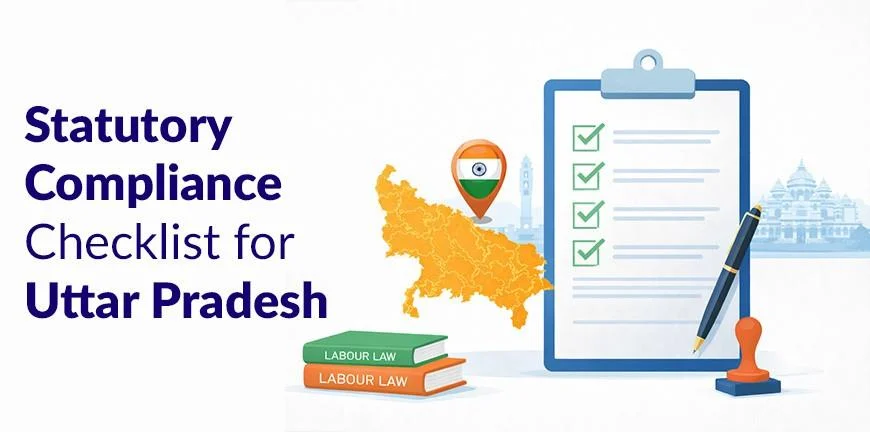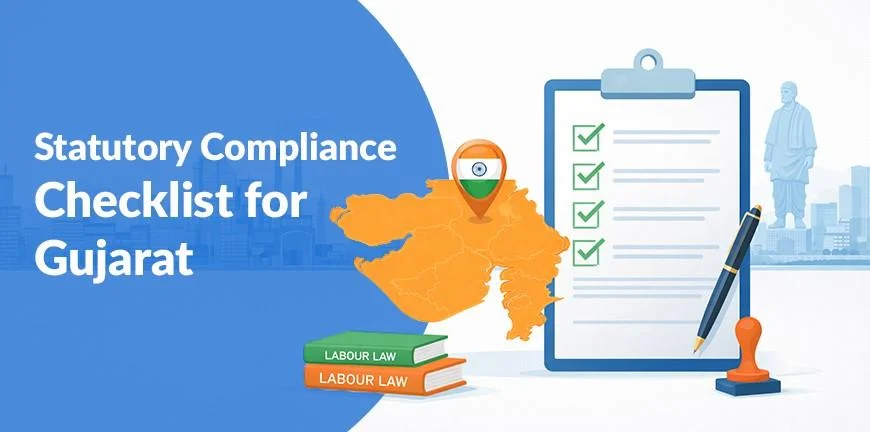
Understanding Labour Law and Industrial Law
06/05/2025
Staff Augmentation vs Outsourcing: Pros and Cons
07/05/2025- What is Professional Tax?
- What is Professional tax in Compliance?
- Who is Responsible to Collect Professional Tax?
- Who is Responsible to Pay Professional Taxes?
- What are the Professional Tax Compliance Requirements?
- Common Challenges in Professional Tax Compliance
- 10 Best Practices for Ensuring Professional Tax Compliance
- Frequently Asked Questions (FAQs)
Any individual or a business entity earning an income that is above a certain limit is obligated to pay a certain percentage of their earning as tax to fund public programs and run the government. Professional tax is one such deduction that is mandatory to be paid by working professionals, business owners, self-employed individuals, and traders.
Any delays or non-payments of professional tax can lead to serious issues which can cause brand reputation damage and operational disruptions. Let’s discuss the role of professional tax compliance in detail to understand its importance and implement the best practices for the best outcomes.
What is Professional Tax?
Professional Tax, or PT, is a tax commonly levied by state governments on income earned through professional services or employment. Typically, professional tax is collected by the company and paid to the state’s commercial tax department.
All salaried professionals, business owners, traders, and self-employed individuals are obligated to pay professional tax as per the regulations, and failing to pay can lead to professional tax compliance issues.
The limit and calculation of professional tax vary state-wise but should not exceed Rs2500 per year. Since PT is state-specific statutory, each state has its own professional tax regulations, slab rates, and payment deadlines. Out of 28 states and 6 union territories, PT is available in 21 states on 1 union territory. These include:
| Andhra Pradesh | Punjab |
| Gujarat | Puducherry |
| Jharkhand | Sikkim |
| Assam | Maharashtra |
| Bihar | Manipur |
| Chhattisgarh | Meghalaya |
| Karnataka | Mizoram |
| Kerala | Tamil Nadu |
| Madhya Pradesh | Telangana |
| Nagaland | Tripura |
| Odisha | West Bengal |
What is Professional tax in Compliance?
Professional tax compliance is adhering to professional tax rules and regulations and companies must develop policies and procedures to ensure there are no violations or delays in professional tax collection and maintaining records of payment. The consequences of non-professional tax registration or other violations can lead to:
1. Penalties
Each state has its own penalty structure for failing professional tax registration, payment deals, and non-filing of tax returns. The penalties may be levied as a percentage of professional tax to be paid, a fixed amount per day, or a particular range based on the duration for which PT has not been paid by the companies. Here is an example of Maharashtra’s penalty structure for violating professional tax regulations.
| Type of violation | Applicable Penalties |
| Failing to carry out professional tax registration | Rs.5/- per day |
| Late filing of professional tax returns | Rs.1,000/- |
| Late payments of PT | Interest @1.25% per month or Penalty @10% |
2. Additional interest
Late payments of professional tax may invoke additional interest charges, and it may vary from state to state.
Who is Responsible to Collect Professional Tax?
Professional tax collection is the responsibility of the commercial tax department of the state government. The employers deduct professional tax for employees as part of monthly deductions and pay it to their state’s commercial tax department within a particular deadline. Self-employed professionals like consultants, freelancers, and business owners must pay professional tax directly to the state government either online or offline as a part of professional tax payment responsibility.
Who is Responsible to Pay Professional Taxes?
The professional tax payment responsibility lies with:
1. Salaries professionals:
Professional tax for employees is deducted from the monthly salary by the employer and paid to the commercial tax department within the prescribed deadlines as a part of professional tax compliance. Ex: If you are a salaried professional in Karnataka, you are liable to pay professional tax if the salary drawn is Rs. 25000 or above.
2. Self-employed individuals
For self-employed individuals such as doctors, lawyers, CAs, architects, etc., professional tax payment responsibility lies with themselves, and rates vary based on the income generated. These individuals must possess a PAN card for professional tax registration and pay the stipulated amount within a set timeline to avoid penalties.
3. Business Owners and Traders
Business owners and traders must also pay PT, and the professional tax calculation varies based on the type of industry and income generated.
Certain categories of professionals are exempted from paying PT as per professional tax regulations. The individuals or entities exempted from professional tax payment responsibility include:
- Military professionals.
- Any individual with a physical disability.
- Senior citizens above 65 years.
- Parents of individuals with physical disability.
- Temporary workers in factories.
- Schools that offer coaching till 12th standard.
- Charitable institutions.
What are the Professional Tax Compliance Requirements?
Here are the key professional tax compliance requirements:
1. Professional tax registration
Every organisation, self-employed individuals, businesses, and traders liable to pay PT must apply for professional tax registration. The registration process can be executed from the respective state’s official tax websites either online or offline.
2. Deduction and Deposit
The professional tax payment responsibility lies with the employer and the PT at the source will be deducted from the monthly salaries of the employees. The PT will then be deposited by the employer to the respective state’s commercial tax department within the prescribed timeline. Any delays or professional tax compliance violations can lead to penalties and legal hassles.
3. Filing returns of professional tax for employers
Employers and self-employed professionals must file professional tax returns either monthly or quarterly as per professional tax rules of the respective state. Accurate records must be maintained and verified during internal and external audits and any errors observed must be mitigated on priority.
4. Exemptions and Deductions
Some state governments in India exempt certain individuals or entities from professional tax payment responsibility based on income and employment categories. It is imperative to be up to date with state-specific professional tax regulations to finalise if you are eligible for exemption or deduction.
5. Ensuring compliance
Non-compliance with professional tax rules can lead to serious consequences like penalties, fines, and legal cases. Both employees and employers must ensure professional tax collection is done as per compliance requirements of the respective state where business operations are established.
6. Stay up to date with the latest professional tax regulations
Professional tax calculations, rates, rules, and regulations are subject to changes and amendments. Staying up to date with the latest professional tax compliance requirements is crucial for employers to prevent legal hassles.
7. Maintaining accurate records and documentation
Employers must ensure accurate records and documentation are maintained for professional tax collection, payments, returns filing, etc. These records will be crucial to proving compliance during internal and external audits by government authorities.
The above steps related to professional tax compliance requirements can be executed by an internal compliance team, but it is advised to partner with a top professional tax compliance agency like ALP Consulting for the best outcomes.
Common Challenges in Professional Tax Compliance
The common challenges encountered by employers to fulfil professional tax compliance requirements include:
1. Complexity state-wise professional tax regulations
Each state in India has its own set of professional tax regulations which can be challenging for companies to create uniform compliance procedures. This is especially challenging for companies that operate in different states across India.
2. Compliance expenses
For small companies and startups, managing the expenses involved in professional tax compliance efforts can be challenging and it can eat into the profits leading to revenue loss and business expansion difficulties.
3. Lack of awareness
Most employees and companies are not equipped to handle professional tax payment responsibilities diligently due to a lack of in-depth knowledge of professional tax regulations and the consequences of non-compliance.
4. Penalties and Legal Hurdles
Ensuring 100% professional tax compliance and preventing penalties is time-consuming for companies, especially the ones with large workforces spread across different states. Creating uniform policies and procedures to meet professional tax compliance requirements in such cases is extremely challenging and expensive.
10 Best Practices for Ensuring Professional Tax Compliance
Here are the 10 best practices to ensure professional tax compliance:
- Utilise state-specific professional tax portal for professional tax registration, payment, and filing returns.
- Leverage technology to automate professional tax calculation and compliance processes. It will improve efficiency and reduce errors leading to better PT compliance.
- Implement an electronic system to save records and documents.
- Use digital calendars like Google Calendar or other apps to set reminders for paying professional tax before deadlines.
- Create a standard operating procedure for professional tax management.
- Create a specific compliance team to oversee all operations related to professional tax management.
- Conduct periodic internal and external audits to identify and mitigate issues related to professional tax compliance.
- Develop a state-specific professional tax compliance requirements checklist.
- Educate employees and managers through regular training sessions on how to achieve professional tax compliance.
- Stay up to date with the latest professional tax rules and laws.
Frequently Asked Questions (FAQs)
1. What is professional tax?
Professional tax is a statutory obligation where companies, self-employed professionals, business owners, and traders must pay a certain percentage of their income, or a fixed rate set by the respective state government’s commercial tax department.
2. How is professional tax calculated?
Professional tax calculation is based on an individual’s or business entity’s monthly income and tax slab rates set by respective state governments. However, for an individual, the professional tax must not exceed Rs. 2500 per year in any state.
3. Which are states and union territories are exempted from paying professional tax?
The states and union territories exempted from professional tax payment responsibility are Arunachal Pradesh, Uttar Pradesh, Himachal Pradesh, Haryana, Rajasthan, Uttarakhand, Goa, Delhi, Chandigarh, Andaman and Nicobar Islands, Lakshadweep, Daman & Diu, and Dadar & Nagar Haveli.
4. Which are the different types of professional tax certificates?
The two types of professional tax certificates are the Profession Tax Enrolment Certificate (PTEC) and Profession Tax Registration Certificate (PTRC).
5. What is the time limit to apply for professional tax registration?
In most states, the time limit to apply for professional tax registration is 30 days.
Contact Us For Business Enquiry

Hariharan Iyer
Hariharan Iyer is the Vice President – Operations at ALP Consulting, bringing over 40+ years of experience in HR outsourcing and labour law compliance. He leads end-to-end HRO operations, ensuring process efficiency, statutory compliance, and seamless service delivery for clients across industries. With a strong background in labour law governance and workforce management, Hariharan plays a key role in driving operational excellence and compliance-led HR solutions at ALP Consulting.




